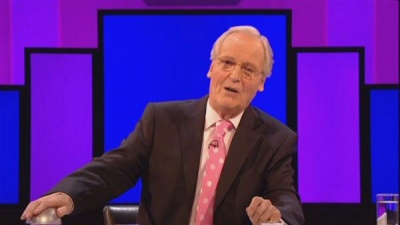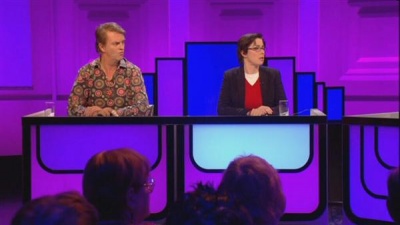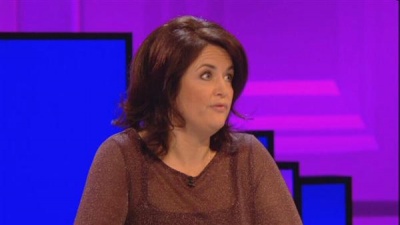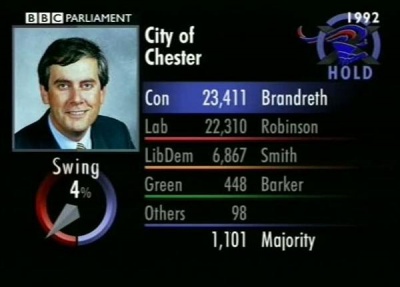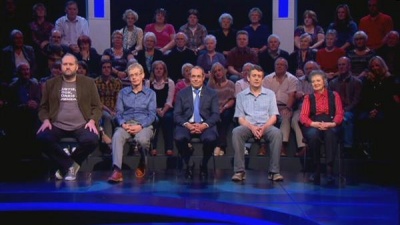Weaver's Week 2012-04-22
Last week | Weaver's Week Index | Next week
Welcome!
Contents |
Just a Minute
BBC Home Service / Radio 4 / World Service, since 1967
BBC2, 26 March – 6 April
Just a Minute has been a radio institution since 1967. Since then, a revolving cast of stars has been invited to talk for 60 seconds without hesitation, repetition, or deviation. The initial regular players – Kenneth Williams, Clement Freud, Peter Jones, and Derek Nimmo – have all vacated the studios for an aprés-vie in palatial radio archives. These gentlemen, and their guests, set the tone for the programme – a panel game controlled (but barely) by Nicholas Parsons.
Since the early 1990s, a new generation of players has come to the fore. Paul Merton is the leader of the pack, it's rare that he misses a recording. Sue Perkins, Julian Clary, and Graham Norton are perhaps the present regulars, but that would ignore Marcus Brigstocke, Tony Hawks, and Josie Lawrence. Then there are folk like Gyles Brandreth, Sheila Hancock, and Tim Rice, who started in the 1980s and continue to appear to this day.
For such a popular programme, television success has proven remarkably elusive. A pilot programme was made in 1980, but progressed no further. Carlton Television made two series in the mid-1990s, but hid it away in a late-night slot, and booked an awful lot of inexperienced players. The BBC put a series out in daytime during 1999, the problem here was not only that the contenders lacked experience, but the line-ups were very variable. For instance, one day had seasoned campaigners Peter Jones, Linda Smith and Wendy Richard joined by Pam Ayres. Another had Richard Vranch, Liza Goddard, Richard Morton, and Tom O'Connor, none of whom would ever find their feet.
As a game, Just a Minute is simple to understand, but hard to play, and harder to win. For many years, it was re-broadcast on the BBC World Service, securing many fans in India. To mark the anniversary, host Nicholas Parsons was dispatched to these JAM festivals, taking along Paul Merton and Marcus Brigstocke, and making a documentary for Radio 4. Goodness, these are highly competitive tournaments, with contenders buzzing in for the slightest intake of breath, or for repetition of any kind. These cut-throat tournaments may be fun to play, but they wouldn't make for good radio.
The genius of the radio production is that the panellists are allowed room to breathe, the space to be themselves, and to interact. Paul Merton and Gyles Brandreth bring out the best in each other, Graham Norton and Tony Hawks spark out wonderfully, and Sue Perkins's anecdotes could gently tease the nuts away from a squirrel without noticing anything.
The television show learned from many mistakes. It went out in prime-time on BBC2: 6pm made it an alternative to the news, and ensured it wouldn't clash with the other comedies on Radio 4. The panelists were sat at adjacent desks, rather than being spaced around a giant clock. Indeed, the studio contained no visual representation of the time: rather than the distraction of how long the player has to go, we had to concentrate on the actual words.
The set was understated, being desks with a gently-changing coloured backdrop, and subtle lights to indicate who buzzed. Richard van t'Riet found the perfect way to direct the programme: as a live performance, the camera gently walking around the set, often coming to rest in a two-shot of Paul Merton and another panelist. Nothing stood in the way of the contest, not even the gentle tinkle of a bell to announce the final round.
Paul Merton was present for all of the recordings, and celebrity lookalike Sue Perkins never tasted defeat in her four contests. Ruth Jones impressed on her debut, and Stephen Mangan added another quality show to his burgeoning CV. Nicholas Parsons was in the chair throughout, and we are never going to forget the panel's reaction when he recited "The Owl and the Pussycat", a favourite poem from his nursery days in the 1920s. Perhaps this explains why the BBC is celebrating Just a Minute's 45th birthday: as much as we all love Nicholas Parsons, and wish that his career will continue to tend towards infinity, it's almost inevitable that time will catch up with him.
So no carping. We enjoy Nicholas Parsons hosting Just a Minute, and we really hope to celebrate the golden anniversary with him.
Wordaholics
Radio 4, 20 February – 26 March
Radio 4 has other word games, of course. One such is Wordaholics, hosted by Just a Minute regular Gyles Brandreth. He's not just Paul Merton's straight man, he is a tremendous wordsmith, raconteur, and entertainer. In the 1980s, Gyles and his JAM co-star Kenneth Williams were regulars in Countdown's Dictionary Corner, and we could suggest that the programme wouldn't have survived into 1984 without them.
Then Gyles disappeared from the screens, to take up a new job in London. Not until 1997 would he return to the Countdown studio, and it would be longer before he was back on Just a Minute. He used the time away to gently buff up his image, and for the last decade has been the unflappable elder statesman of verbiage. While it might take lesser mortals the rest of the night to find the mot juste on a band's performance, Gyles would know what to say even before the mike stand's been kicked over.
His latest project is Wordaholics, a panel show for Radio 4. Informally, his co-star in this project is Natalie Haynes, as she took part in all of the recordings. The other participants are a galaxy of word-mongers and intellectuals: Paul Sinha from The Chase, former children's laureate Michael Rosen, punster Milton Jones, Countdown regular Susie Dent, and Countdown contestant Alex Horne. The show has been able to secure a quality panel, and doesn't waste them.
After some opening remarks – the panel's favourite word, phrase they'd like to never hear again – round one is introduced. It's the Letter of the Week, in which Gyles talks about a letter as though it were a catwalk model, describing the perfect proportions of the letter X, or the curvaceous form of B. All of this is to allow Gyles to ask questions about words beginning with that letter – what does it mean, where did it come from?
For correct answers, Gyles will award points – four of them for a perfect answer, fewer for partial credit. He'll go on to round two, which varies from week to week: there's been some cockney rhyming slang, in which we learn that Michael is used for a scouring pad, on the grounds of "Michael Portillo" — Brillo.
Gyles has never been one for brevity or over-simplification. If there's a simple thought, he will pick the most florid language, tickle the extremities of English, in an effort to make it that little bit more attractive. The regular Not In So Many Words round attempts to reverse the flow, translating a complex piece of jargon into standard argot, removing the mystery from complex and confusing terminology.
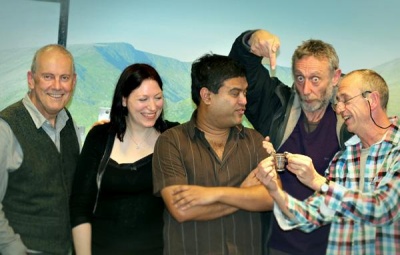 Gyles Brandreth looks on as Natalie Haynes, Paul Sinha, Michael Rosen, and Arthur Smith admire a trophy.
Gyles Brandreth looks on as Natalie Haynes, Paul Sinha, Michael Rosen, and Arthur Smith admire a trophy.
The final round, New Words for Old, is introduced by another recurring skit, that of an old dictionary being brought into the studio by someone walking very slowly. Here, Gyles takes words that were in slang currency a century or two ago, and asks the panel to give them a more modern equivalent. After declaring a winner, the panel are asked for a word or phrase to explore their feelings, often re-using one of the words or themes explored in the programme.
Wordaholics is a successful panel game, because it skips along as light as a meringue. Gyles Brandreth injects the warm air, but it's the panel who beat the show into shape: the combination of comedians and literary giants ensure that it's a welcome pleasure, and the show is easy listening. It's also slightly educative – we now know what an able whackett is, even if we can't spell it.
Countdown Update
Gyles may not have appeared in Dictionary Corner since 2008 (and, surely, it's about time he came back), but many people have been there. So have lots of contestants, and the YTV Teapot Factory has been doing double-time to keep pace with the demand. Gerri Kostrzewa was the champion when we last looked in, she won two games before losing to Rajhoo Carooppunnen. Two wins, then Mick O'Brien began his two-win run. Wendy Gabriel recorded just the one win.
The quality of play improved with Alison Shipman and John Bird recording three wins each, then Rob Gibney had four victories. Even in defeat, Mr. Gibney passed 90 points, and should he make the finals, he will be a very dangerous floater. Nathan Steggles took the win, 94-93, but was gone after three wins. Then Hilary White won two, and Matt Heal won two tense games – all of his matches went to crucial conundrums. Monica Sutcliffe inflicted defeat on Friday.
At the moment, the finals board is:
| 1 | Jack Worsley | 8 wins | 818 pts |
| 2 | Peter Lee | 8 | 801 |
| 3 | Victoria James | 6 | 567 |
| 4 | Mark Murphy | 5 | 454 |
| 5 | Rob Gibney | 4 | 486 |
| 6 | Chris Butler | 3 | 362 |
| 7 | John Bird | 3 | 314 |
| 8 | Nathan Steggles | 3 | 309 |
We understand that the finals will return to their historic position at the very end of June, a distraction from the Wimbledon Rainwear Expo.
Mastermind
Second Round, Match 5
This edition went out at 6pm on Saturday in Northern Ireland, 8pm on Saturday in Wales.
James MacKenzie will be driving down Route 66 (Chicago – Santa Monica) in 90 seconds. Named by Cyrus Avery, the road grew in importance during the 1930s depression, and was heavily used by the military in the 1940s. It passes from diner to diner, occasionally stopping off at a town or city, and was the set for the recent movie "Cars". Route 66 was formally decommissioned in 1985. The round is nearly perfect, but the contender gets a date One! Year!! Out!!! 13 (0) Drive more: Billy Connolly's Route 66*.
Anthony Barton takes Flanders and Swann (1939-67). Formed at Westminster school, the pairing of Michael Flanders and Donald Swann wrote witty melodies for all ages. They're best known for "The Hippopotamus Song" and "The Gasman Cometh", and the revue "At the Drop of a Hat" ran for seven years. The pair quit while they were ahead; the round quits at 7 (1). Chuckle more: the best of Flanders and Swann*.
George Ferzoco will discuss the Italian football team since 1978. Champions of the 1981, '84, and '86 unofficial world cups, partly from qualifying as co-hosts, Italy hasn't been able to replicate success in the official tournaments: their best result is a quarter-final place in 1991. Sergio Guenza twice guided the team to the finals of the European Nations' Cup, but it's clear Italy is not quite the best footballing side in the world. 10 (0).
Alan Clarke has been reading the Ramage Novels of Dudley Pope (1925-97). A series of 18 books tells the story of Nicholas Ramage, an upper-class sailor in the Royal Navy. While slightly unrealistic (Ramage is always in the right place to advance the narrative), Pope's work are generally held to be faithful to their time. That is a faithful round, that is a perfect round. 13 (0). Sail more: Ramage at Trafalgar*.
Maya Davis will now be watching British owls. Birds like the Barn Owl, Long-eared Owl, Little Owl, and Tawny Owl are nocturnal predators, and believed in folklore to be a harbinger of doom. The birds also lead packs of Brownies. Another quality round ends on 12 (0). Hunt more: Stephen Savage's introductory book*.
Anthony Barton is back amongst us, he qualified on 17 February with the Franco-Prussian War. He won't win tonight, finishing on 10 (6). George Ferzoco also came through from 17 February, but the other show, where he took the Life and Work of Federico Fellini. He remembers the erstwhile Only Connect star δ to win that night's title, and he remembers the saint to whom the cathedral in Orkney is dedicated – this programme's patron, St. Magnus. 19 (3).
Maya Davis qualified on 18 November last year, when she took the Life and Work of Gerard Hoffnung. She begins with the author of Aesop's fables, types of apples, and John Bunyon, but a gratuitously long question about the Kurds succeeds only in losing contender and this viewer. It only throws the contender for a moment, a runcible spoon and that old parlour game Twenty Questions help her to 25 (1).
Winning on 3 February was James MacKenzie, when he took the Lost Railways of West Yorkshire. Father Ted, Joe di Maggio, Louis XVI and the Fukushima nuclear plant kick off his scoring round. There's a pass shortly after this break comes to an end, and he's not quite word perfect on a Police song title, and that seems to break the contender's confidence. The round spirals down, ending on 21 (3).
So Alan Clarke needs another thirteen to win; the tie is (looks at clock) unlikely. He came through the heats on 24 February, taking Luton Town FC since 1965. This contender remembers the silent Marx brother, the T Rex albums, and where to find Jutland. The first pass follows, but it's in a run of some errors. Humpho discusses answers to a couple of questions, but even so, the contender is a bit lucky to get a question out just on the buzzer. His final score: 24 (1).
Which means that Maya Davis will claim a place in the final.
This Week And Next
Straight to the ratings for the first week of April, where Britain has a new number one. The Voice of Holland UK (10.7m viewers) managed to remain ahead of Britain's Got Talent (10.3m) even after accounting for people who watched the shows on videotape and video-on-demand. The Chance to Go Into Business with Alan Sugar (the programme formerly known as The Apprentice, except he's not actually seeking an apprentice) was seen by 7.5m, and The One and Only Des O'Connor attracted 3.55m viewers on Easter Sunday night.
The Chance... You're Fired led on BBC2 with 2.75m viewers, and Channel 4's Jimmy Carr Does Deal or No Deal picked up 2.05m. Best score of the year for Four in a Bed, 1.5m saw Wednesday's show. On the digital tier, 2.26m for Celebrity Juice, 865,000 for the Sunday repeat of Britain's Got Talent, and 820,000 for the repeat of The Voice on BBC3. An old Gory Games hit CBBC for 285,000 viewers, and late-night repeats of Blockbusters on Challenge broke through 100,000 viewers – many of them were hoping to see David Dimbleby host Question Time, but it wasn't on, and Bob Holness did it better.
New this week: Counterpoint (Radio 4, 3pm Monday), Trade Your Way to the USA (CBBC, 4.30 weekdays), and 8 Out of 10 Cats (C4, 9pm Friday). There's also a special edition of QI (BBC2, 10pm Friday). Saturday has the return of Pointless Celebrities (BBC1, 5.35) with Esther Rantzen and John Virgo; later, it's the first live show in The Voice of Holland UK (7pm).
Links marked with a * help support the UKGameshows servers.
To have Weaver's Week emailed to you on publication day, receive our exclusive TV roundup of the game shows in the week ahead, and chat to other ukgameshows.com readers, sign up to our Yahoo! Group.

